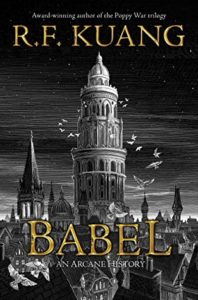
This review is based on an eARC (Advance Reading Copy) provided by the publisher via NetGalley in exchange for an honest review. Babel will be released on August 23, 2022.
I’m not sure there’s a more anticipated release in my corners of sci-fi/fantasy spaces than R. F. Kuang’s Babel, or The Necessity of Violence: An Arcane History of the Oxford Translators’ Revolution. Fresh off her win of the Astounding Award for Best New Writer on the strength of her Poppy War trilogy, Kuang’s next project involved visiting a magical 19th-century Oxford. And between how much I enjoyed her previous work and my affinity for academic settings, asking for an ARC was an extremely easy decision. To my surprise, I was approved, so here we are, talking about what I expect to be one of my favorite books of the year.
The vast majority of Babel is written from the perspective of Robin Swift, a Chinese youth brought to England after the death of his mother and trained under a famed Oxford linguist before his matriculation to study in the Royal Institute of Translation. There he learns about the translation-based magic that has enabled the global dominance of the British Empire, and that he is just one of many foreigners recruited to use his native tongue in service of the Crown.
I suppose I shouldn’t be surprised, given the subtitle, but I was struck by how quickly it became obvious that the British were the villains of this story. I expected initial ambiguity accompanied by a growing realization that the friendly facade was just that, but this wasn’t this sort of book. Robin understands from the outset that he’s being used, and his journey is one of discovering the depth of that use, squaring it with the material benefits he’s been given, and figuring out what to do about it. And, as it turns out, that’s enough material to support a pretty robust, multi-year character arc.
Of course, it is a long novel, and it’s an academia novel, and not every element exists to send Robin forward on his personal journey. We learn a lot about life at this fantastical Oxford, as well as about the delightfully clever language-based magic system that uses what is lost in translation to power its effects. Included are copious footnotes about languages and bits of actual history brought to bear in the meticulous construction of a stunningly detailed magical British Empire. Fans of careful worldbuilding and hard magic systems will have a lot to like here, and the rhythm of the story will appeal to readers who enjoy school settings.
But ultimately, it’s a tale about revolution, and—as the title suggests—the necessity of violence. And the character work that brings Robin from comfortably enjoying his study despite an awareness of not being fully accepted to entangling himself with revolutionaries is excellent. What was less satisfying was the resolution of some of the intramural disputes among his fellows. Kuang does a good job presenting various attitudes, from gratitude for the Empire’s gifts, to non-violent resistance, to outright violence, all leading to a thunderous climax. But while the culmination of plot feels nearly perfect, the character threads don’t all tie together as neatly. And as a vocal partisan of messy endings, perhaps I have little room to complain. But there’s one side character whose balance between insight and recklessness didn’t feel quite right, and there’s another character whose backstory was relegated to an epilogue after finishing the main plot on an incomplete note.
To be clear: Babel is the best book I’ve read so far this year. It’s engaging, with excellent worldbuilding and character arcs and a setting that feels 19th century without prose that feels 19th century. It may be a miss for readers who dislike school settings or revolutions, but it’s undoubtedly one of the best fantasy books released this year. My complaints come into play as I mentally suss out the difference between an annual favorite and an all-time favorite. And if you’ve made it to that conversation, you’ve done a whole lot right.
Recommended if you like: school settings, worldbuilding, magic systems, anticolonialism, languages.
Can I use it for Bingo? It is very much hard mode for Revolutions and Rebellions, as well as Standalone and probably Mental Health. It is also a Historical Fantasy that will be Published in 2022 by a BIPOC Author who Uses Initials, where Family Matters and there are No Ifs Ands Or Buts. There’s a whole lot to Bingo here.
Overall rating: 18 of Tar Vol’s 20. Five stars on Goodreads.
